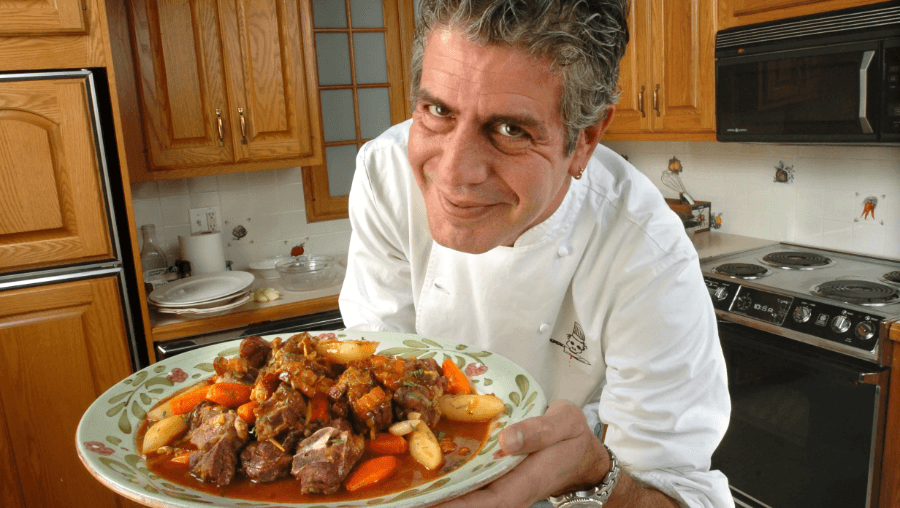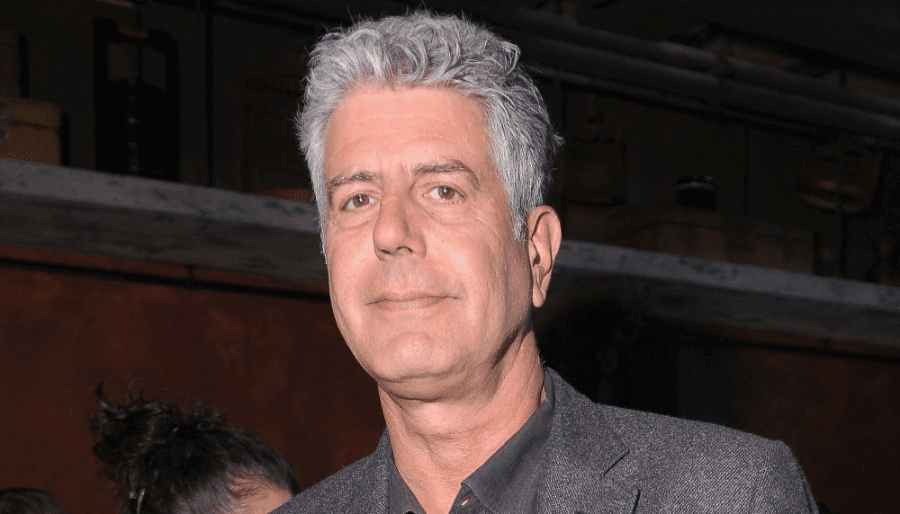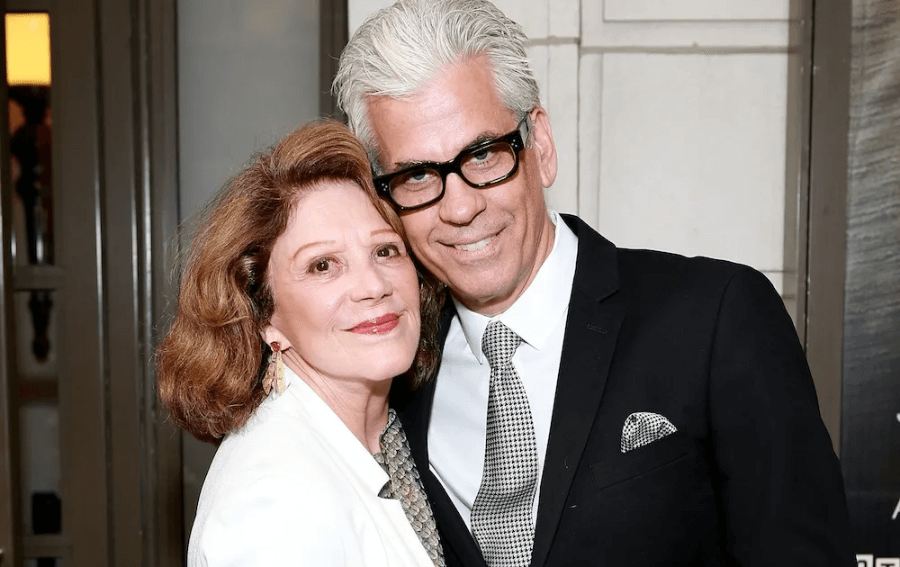📑Table of Contents:
- Early Life and Career of Anthony Bourdain
- Anthony Bourdain’s Transition to Television
- Anthony Bourdain’s Philosophy: Food, Travel, and Authenticity
- The Personal Struggles of Anthony Bourdain
- Breakthrough with “Kitchen Confidential”
- No Reservations & Parts Unknown: Changing the Narrative
- His Influence on Global Perception of Food
- Relationships and Collaborations
- Mental Health Awareness After His Death
- How the Culinary World Remembers Him
- The Legacy of Anthony Bourdain
- Conclusion

Anthony Bourdain, an iconic chef, author, and television personality, became a household name through his unique blend of food, travel, and storytelling. With a deep passion for exploring cultures, Bourdain wasn’t just a chef; he was a bridge between diverse communities, bringing the world closer through the universal language of food. His raw honesty, adventurous spirit, and unfiltered opinions made him a beloved figure in the culinary world.
However, beyond his public persona, Anthony Bourdain’s life story was layered with struggles, triumphs, and an unwavering curiosity about the world. In this blog post, we explore the journey of Anthony Bourdain, his impact on the culinary world, and the lasting legacy he left behind.
Early Life and Career of Anthony Bourdain
Anthony Michael Bourdain was born on June 25, 1956, in New York City. His early life was marked by an interest in food, which developed from his childhood experiences in the city. After attending the Culinary Institute of America (CIA), Bourdain started his career in the restaurant industry, quickly climbing the ranks in kitchens across the United States. His early career was marked by hard work, long hours, and the intense pressure that often accompanies working in high-end restaurants.
Bourdain’s rise to fame didn’t come from his work in the kitchen alone, though. In 2000, he published his first book, Kitchen Confidential: Adventures in the Culinary Underbelly. The book was a tell-all, exposing the grittier side of the culinary world—the long hours, the egos, and the chaotic environment of professional kitchens. The candid nature of Kitchen Confidential resonated with readers and caught the attention of the media, setting the stage for Bourdain’s foray into television.
Anthony Bourdain’s Transition to Television
After the success of Kitchen Confidential, Bourdain was approached to create a television series. In 2002, he began hosting “A Cook’s Tour” on the Food Network, where he traveled the world, exploring food and culture. The show allowed him to combine his love for cooking with his deep curiosity about the world, providing a platform for Bourdain to reach a broader audience.
However, it was his next show, No Reservations on the Travel Channel, that truly cemented Bourdain’s place in television history. In No Reservations, Bourdain traveled to some of the most remote and fascinating parts of the world, often diving into the cultural and political landscape of each destination. His ability to connect with people from all walks of life and his willingness to embrace new and sometimes uncomfortable experiences made him stand out in a crowded television landscape.
Bourdain’s travel shows were unique in that they weren’t just about food; they were about the people, the places, and the stories that food could tell. Whether it was eating street food in Vietnam, sampling traditional dishes in Morocco, or exploring the culture of New York City, Bourdain’s shows were always as much about storytelling as they were about the food.
Anthony Bourdain’s Philosophy: Food, Travel, and Authenticity
What set Anthony Bourdain apart from many of his peers was his commitment to authenticity. He didn’t just show food on his shows; he showed the human side of food—how it connects people, tells stories, and reflects the cultures that create it. Bourdain was never content with a surface-level exploration. He sought to uncover the deeper truths about the places he visited, and he didn’t shy away from exploring controversial or difficult subjects.
His shows often tackled complex issues, from the impact of war on local food culture in places like Iraq to the effects of political unrest in Haiti. Bourdain’s interviews with locals were never about surface-level topics; they were about getting to the heart of what made each culture and each meal unique.
One of Bourdain’s most memorable qualities was his ability to break down barriers. He made food accessible to everyone, regardless of background. Whether he was dining with world leaders or sharing a meal with street vendors, Bourdain made it clear that food was a universal language that could unite people across cultures.
The Personal Struggles of Anthony Bourdain
While Anthony Bourdain’s career and public persona were marked by success, his personal life was not without challenges. Bourdain was open about his struggles with addiction, particularly his battles with drugs and alcohol in his early career. In his memoir Kitchen Confidential, Bourdain candidly discussed his history of drug use and his experience of hitting rock bottom before turning his life around.
Despite his success and the external perception of a glamorous lifestyle, Bourdain’s personal life was often turbulent. He had several high-profile relationships, including a marriage to Ottavia Busia, with whom he had one daughter, Ariane. He later dated Italian actress Asia Argento. Their relationship, which started in 2017, was highly publicized and appeared to have a significant impact on Bourdain’s life.
However, in June 2018, Bourdain tragically died by suicide while in France filming for his show Parts Unknown. His death sent shockwaves through the world, leaving fans, friends, and colleagues grappling with the loss of a man who had always been seen as larger-than-life.
Breakthrough with “Kitchen Confidential”
Anthony Bourdain became a household name after releasing Kitchen Confidential in 2000. The book pulled back the curtain on restaurant life. It revealed the chaos, grit, and beauty behind professional kitchens. His raw honesty captivated both chefs and casual readers. The book exposed drug use, stress, and passion in the culinary world. It gave voice to a subculture rarely seen by the public. Bourdain’s writing was sharp, humorous, and deeply personal. He spoke like a chef but thought like a poet. Kitchen Confidential made food writing bold, edgy, and cool. It inspired chefs to tell their own stories without filters. The book’s success led to interviews, book deals, and eventually television.
No Reservations & Parts Unknown: Changing the Narrative
With No Reservations and Parts Unknown, Bourdain changed food television forever. He didn’t just eat—he listened, observed, and explored. His shows went beyond dishes. They explored culture, politics, and the human condition. He visited places most networks avoided. From Beirut to Congo, he highlighted stories often ignored. In Iran, he focused on shared humanity over headlines. In Haiti, he exposed post-disaster exploitation and resilience. Bourdain’s episodes were intimate, gritty, and unscripted. He didn’t glamorize poverty. He didn’t sanitize the truth, and he gave locals a platform to speak for themselves. Viewers saw a world far beyond fine dining. He redefined food shows as tools for empathy and understanding.
His Influence on Global Perception of Food
Bourdain helped people see food differently. He believed food was a language that crossed all borders. He showed that food is about people, not presentation, and he found meaning in street food, not just Michelin stars. Bourdain celebrated meals cooked by grandmothers and market vendors. He respected tradition, culture, and the struggle behind every dish. He connected food to history, war, and migration. His storytelling made viewers question their assumptions. He encouraged curiosity and humility. His influence helped shift global food media. It became more inclusive, grounded, and socially aware. Bourdain made food about connection, not status.
Relationships and Collaborations
Bourdain formed deep bonds with people around the world. He built friendships with chefs, locals, and fellow storytellers. Eric Ripert was one of his closest friends. Their bond was built on respect, trust, and humor. He collaborated with talented producers, fixers, and translators. He valued their voices in crafting honest stories. Bourdain treated his crews as equals. He credited them openly and often. He was known for treating locals with care and dignity. Whether dining with war survivors or taxi drivers, he made people feel seen. His relationships shaped the soul of his work. He built bridges through meals, not interviews.
Mental Health Awareness After His Death
Anthony Bourdain’s death shocked the world in 2018. It sparked urgent conversations about mental health and suicide. People couldn’t believe someone so admired felt so broken. His passing showed that success doesn’t protect you from struggle. It opened up dialogue, especially among men and creatives. Fans, friends, and public figures shared their own battles. The food world began speaking more openly about burnout and depression. Mental health became a more visible issue in kitchens. His death encouraged awareness, support, and prevention efforts. Though tragic, his story helped others feel less alone. The world began to listen more closely after he was gone.
How the Culinary World Remembers Him
The culinary world continues to honor Anthony Bourdain. Chefs hold tribute dinners and moments of silence in kitchens. Murals of Bourdain appear in cities worldwide. His quotes are tattooed on arms and restaurant walls. The documentary Roadrunner explored his complex legacy. It sparked renewed love and difficult questions. Foundations in his name support mental health and culinary causes. Cookbooks and essays still mention his influence. Many chefs credit him for changing their careers. Food shows now carry deeper stories because of him. His spirit lives in dishes that connect and heal. Anthony Bourdain remains a guiding voice in food and beyond.
The Legacy of Anthony Bourdain
Despite his untimely death, Anthony Bourdain’s legacy lives on. His work continues to inspire chefs, travelers, and storytellers worldwide. His ability to blend food, culture, and humanity in a way that was both entertaining and educational has inspired a new generation of travel hosts and food journalists.
Bourdain’s impact goes beyond his television shows and books. He was a vocal advocate for the importance of authenticity and inclusivity in both food culture and society as a whole. He believed in giving a voice to the underrepresented and in celebrating the diverse stories that make the world a fascinating place. His empathy and willingness to engage with people from all walks of life made him beloved by fans and peers alike.
In the years following his death, several posthumous projects have continued to honor his work. The documentary “Roadrunner: A Film About Anthony Bourdain” was released in 2021, offering a closer look at his life and career, while his memoir and cooking shows continue to inspire fans worldwide.

Conclusion
Anthony Bourdain’s story is one of passion, struggle, and profound impact. Through his shows, books, and interviews, Bourdain brought the world closer, exploring the beauty and complexity of different cultures through food. His candidness about his struggles, combined with his unwavering curiosity about the world, made him a beloved figure in both the culinary and television industries.
Though his life was cut short, his legacy endures, reminding us of the power of storytelling, food, and empathy in bridging cultural divides and creating meaningful connections.





